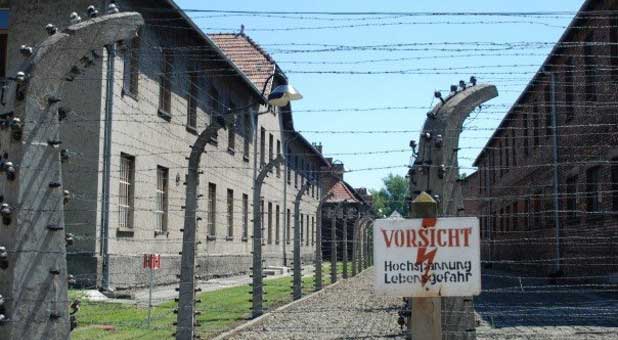There’s even a growing phenomenon of Israeli Arabs making the trip to Poland to learn and understand how the horrors of seven decades ago still impacts their Jewish neighbors today. Many of these trips are accompanied by survivors who share their personal stories and experiences—literally—in the places where they suffered the most.
On the evening of the beginning of Yom HaShoah observances, the tone of the country becomes somber. TV programming that is entertaining or frivolous is typically canceled, and sometimes an entire station either changes its programming to Holocaust-related themes or broadcasts a still photo of a memorial candle with a meaningful statement for most of the, if not the whole, day.
Days before that, TV, radio and print media already begin to provide content relating to the stories of survivors and those who perished. I am saving links; feel free to email me, and I will pass along a selection of articles and stories depicting the personal horrors of individuals and even acts of heroism and miracles that took place amid the unspeakable atrocities.
A month ago, I walked into synagogue with my son. He said something about being hungry. Mr. Weiser, the elderly man who sits two rows behind us, shared that when he was in Auschwitz, for three days he only had snow to eat. Hearing things like this in Israel are not uncommon. Nevertheless, they can never be taken for granted or forgotten.
On the morning of Yom HaShoah, schools throughout the country paused to remember the 6 million in somber ceremonies. For those who are too young and for whom a ceremony would not be fitting, they are taught that we are sad and remembering what happened to the Jewish people in an age-appropriate way. Then, across the nation and at the same minute, the country’s air raid sirens sounded and people literally stopped in their tracks to stand silently, in prayer and reflection, no matter where they were. Of course, we are aware that the very need for air raid sirens represent another ongoing threat to Israel and the Jewish people, but that’s below the surface.
Sometimes the sirens are the formal beginning of the ceremonies that take place in schools, synagogues and community centers nationwide. Sometimes preschool kids are on a playground and stop to stand at attention instinctively. Cars and buses stop where they are and passengers stand at attention inside or get out and stand on the street. Pedestrians shopping, jogging, walking between meetings and anywhere else stop in their tracks.
For one long minute, almost the entire country stands together in silent memory.
At the official state ceremony in memory of the victims, Prime Minister Netanyahu spoke passionately, quoting Scripture, referenced the Iranian threat that still looms, and noted that he shared with Canadian Prime Minister Harper how his main job as prime minister of Israel was to ensure that there would never be another Holocaust.












